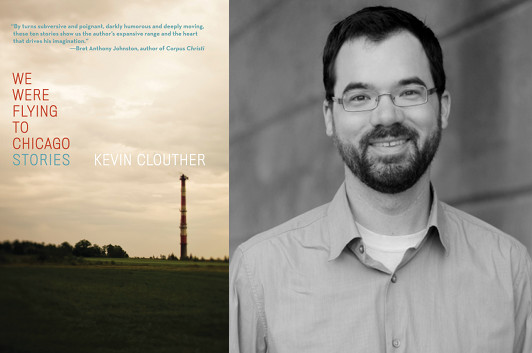Kevin Clouther & the Vision of Chekhov

photo via Black Balloon Publishing
I’ve been dipping in and out of the stories in Kevin Clouther’s debut collection, We Were Flying to Chicago, over this long weekend, and they’re fantastic. In the title story, Clouther takes on the collective consciousness of a group of airplane passengers, from the long stretch of time they’re stuck on the runway waiting to take off to the moment they finally reach Chicago—not their final destination, but they’ll be stuck there, too. It’s a portrait of boredom and frustration that escapes both in its own telling, approaching a kind of abstraction even in its particular details. In this guest essay, Clouther considers Anton Chekhov’s own eye for detail, and the vividness of his stories.
I rarely think about Anton Chekhov’s stories while I’m writing, though I often think about them as I’m living, which ought to be higher praise. There is a celebration of existence in his stories that is more than earnest or unembarrassed—it’s triumphant, as if the writer is grabbing the reader by both arms and insisting this person lift his or her grubby head to look, if only for a moment, at the world as it actually presents itself. Here is Chekhov (translated beautifully, as always, by Pevear and Volokhonsky) in “The Man in a Case”:
It was already midnight. To the right the whole village was visible, the long street stretching into the distance a good three miles. Everything was sunk in a hushed, deep sleep; not a movement, not a sound, it was hard to believe that nature could be so hushed. When you see a wide village street on a moonlit night, with its cottage, haystacks, sleeping willows, your own soul becomes hushed; in that peace, hiding from toil, care, and grief in the shadows of the night, it turns meek, mournful, beautiful, and it seems that the stars, too, look down on it tenderly and with feeling, and there is no more evil on earth, and all is well.
I forgot that I ever looked at a street like this until Chekhov reminded me: I love when writers do that. The transition from the third person to the second is a gesture I would be reluctant to make, but Chekhov does it so readily, and with such confidence, that I trust there is something universal here. The last endless sentence does so many things I wouldn’t dare, like the accumulation of abstract adjectives—”meek, mournful, beautiful”—and frank consideration of “evil on earth.” He doesn’t shy from discussing the soul. Committing the pathetic fallacy doesn’t bother him, either.
It all reminds me of the last four lines of “Composed upon Westminster Bridge, September 3, 1802,” a gem from the other end of the same century (would Chekhov have read Wordsworth?):
Ne’er saw I, never felt, a calm so deep!
The river glideth at his own sweet will:
Dear God! the very houses seem asleep;
And all that mighty heart is lying still!
As for the oft-anthologized and justly admired “The Lady with the Little Dog,” I challenge the reader to find a more human—and less predictable—portrait of the way love can surprise and overwhelm two people. I could praise pretty much the whole story; instead, I will share one sentence from the unjustly ignored “Rothschild’s Fiddle” for the pure pleasure of watching my hands make the words appear on the screen:
She was gazing at the ceiling and moving her lips, and her expression was happy, as if she could see death, her deliverer, and was whispering to him.
Or consider the glorious ending to “Gusev,” a story that takes place not in Chekhov’s native Russia but at sea:
And up above just then, on the side where the sun goes down, clouds are massing; one cloud resembles a triumphal arch, another a lion, a third a pair of scissors… A broad green shaft comes from behind the clouds and stretches to the very middle of the sky; shortly afterwards a violet shaft lies next to it, then a golden one, then a pink one… The sky turns a soft lilac. Seeing this magnificent, enchanting sky, the ocean frowns at first, but soon itself takes on such tender, joyful, passionate colors as human tongue can hardly name.
Who hasn’t watched the sky in just this fashion? Shapes pass, one color gives way to another. Here again is a trio of abstract adjectives—”tender, joyful, passionate”—and here again is the pathetic fallacy. But how does the ocean frown? I’ve lived by the ocean most of my life, and I don’t know, though I think I understand.
26 May 2014 | selling shorts |

 Our Endless and Proper Work is my new book with Belt Publishing about starting (and sticking to) a productive writing practice.
Our Endless and Proper Work is my new book with Belt Publishing about starting (and sticking to) a productive writing practice. 
